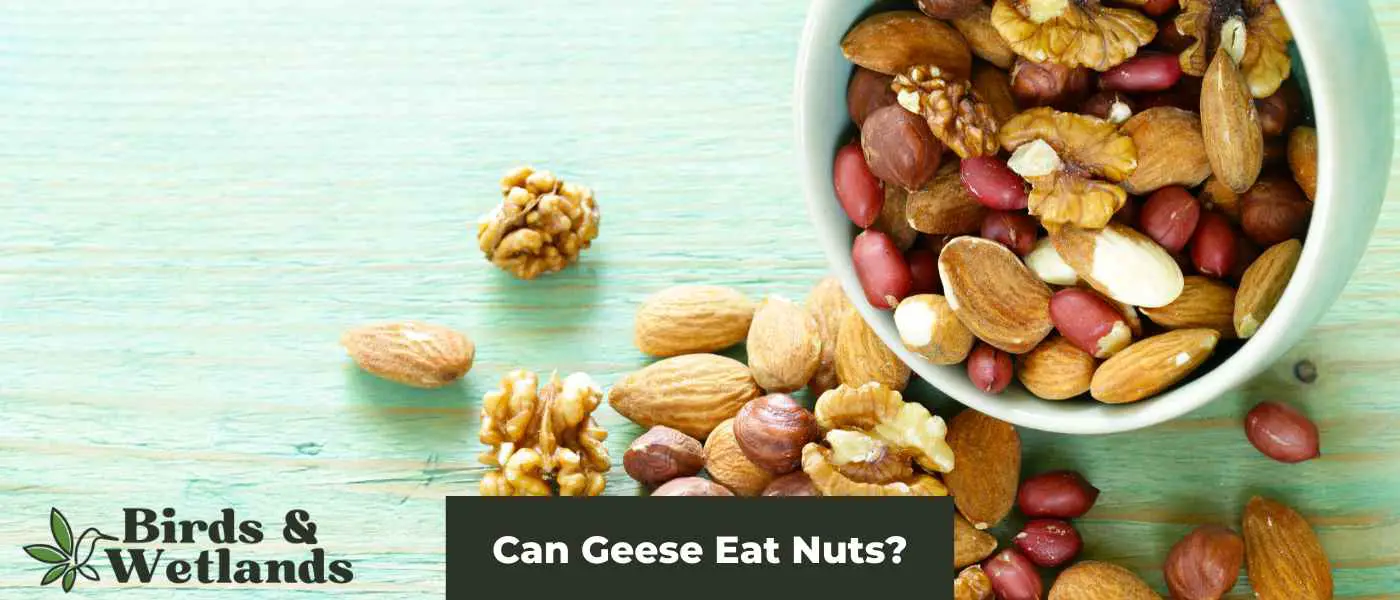Geese are usually considered omnivores because they eat both plant and animal foods. But these water birds are primarily herbivores that eat a wide range of plant material, including fruits, plant roots, vegetables, aquatic plants, sedges and grasses. They also feed on animals such as insects, snails, fish and aquatic invertebrates.
But can geese eat nuts?
Geese can technically eat nuts, but they are not a natural part of their diet and should be fed sparingly or avoided altogether. Geese are primarily herbivores and their natural diet consists of plants, grasses, and small aquatic organisms.
Nuts can be a nutritious addition to a goose’s diet. They are high in nutrients such as protein, fiber, and vitamins. They also have antioxidants, which are beneficial to the goose. Nuts contain fat, essential for good health, especially during winter. The type of nut eaten by a goose determines how healthy it is for them.
Key Points on Geese Foods and Diet
- Geese are usually considered omnivores, but most of their diet comes from plant material.
- Nuts are high in protein, fiber, fats and vitamins, making them a nutritious addition to a goose’s diet.
- Canadian geese and other wild geese eat nuts but don’t actively search for them when grazing for food.
- At age five to six weeks, baby geese can start eating small amounts of solid foods, including nuts.
- Raw peanuts, granola, pecans, pistachios, and peanut butter are safe for geese to eat. However, moderation is key since too many nuts can cause digestive problems or liver damage.
Do Canadian geese eat nuts?
Canadian geese eat a wide range of foods. Their diet primarily includes grass, sedge, aquatic vegetation, insects, and small fish. They will, however, consume grains and seeds. When nuts are available, they will undoubtedly consume them.
This is why it’s important to exercise caution when planting nuts in areas where Canadian geese are known to congregate.
Avoid feeding geese and other birds bread and other processed foods. Instead, give them some chopped nuts. Bread is junk food for them, and they tend to overeat when they eat bread. They gain weight from overeating.
Moreover, poor nutrition can also lead to a condition called the angel wing. So while they enjoy eating bread, it is best to avoid offering them this food. Human foods with little to no nutritional value to geese are considered toxic foods for them.
Here is a table that lists the nutrients in nuts and the benefits for geese:
| Nutrient | Amount per 100 g (various nuts) | Benefit for Geese |
|---|---|---|
| Protein | 20-25g | Supports the growth and maintenance of muscles, feathers, and bones |
| Healthy Fats (monounsaturated and polyunsaturated) | 50-70g | Supports heart health and overall well-being |
| Fiber | 6-10g | Supports healthy digestion and helps regulate bowel movements |
| Magnesium | 300-400mg | Supports proper heart and muscle function, as well as proper bone health |
| Vitamin E | 7-15mg | Supports a strong immune system, as well as healthy skin and feathers |
It’s important to note that different types of nuts have varying nutrient profiles, so it’s best to offer a variety of nuts to geese. Additionally, this table only provides a general idea of the nutrient content of nuts and is not meant to replace veterinary advice for determining the best diet for your pet goose. Also, nuts are high in fat and calories, so it’s important to feed them in moderation as part of a balanced diet.
Feeding too many nuts to geese can lead to several potential health problems, including:
- Nutrient Imbalance: While nuts do provide many important nutrients, they are not a complete source of nutrition for geese. Feeding too many nuts can lead to a nutrient imbalance and potentially cause health problems.
- Weight Gain: Nuts are high in fat and calories, which can contribute to weight gain in geese if they are fed in excess.
- Choking Hazard: Nuts can be a choking hazard for geese, especially if they are fed whole or in large pieces.
- Risk of Contamination: Nuts are commonly exposed to contaminants such as mold, fungi, and bacteria during storage and transportation. Feeding contaminated nuts to geese can lead to health problems.
- Indigestion: Nuts are difficult for geese to digest and can lead to indigestion if they are fed in excess.
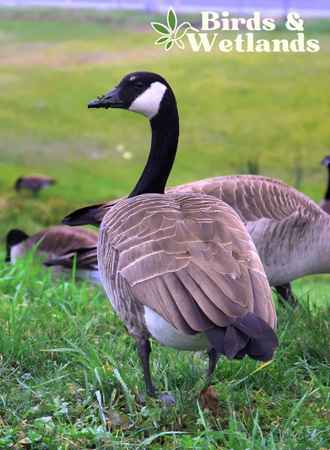
What are the Best Types of Nuts for Geese?
The best nuts to feed geese are those that provide a variety of nutrients and can be safely consumed. Some of the most commonly recommended nuts for geese include:
- Almonds: Almonds are a good source of protein, healthy fats, fiber, and vitamin E. They can be offered whole, chopped, or ground.
- Walnuts: Walnuts are a good source of protein, healthy fats, fiber, and magnesium. They can be offered whole or chopped.
- Peanuts: Peanuts are a good source of protein, healthy fats, and fiber. They should be offered in a shelled form as the shells can be a choking hazard for geese.
- Pecans: Pecans are a good source of healthy fats, fiber, and magnesium. They can be offered whole or chopped.
- Hazelnuts: Hazelnuts are a good source of protein, healthy fats, fiber, and vitamin E. They can be offered whole or chopped.
Do other wild geese eat nuts?
While the diet of Canada geese is mostly herbivorous, consisting of things like grasses, sedges, and grains, they will also eat small amounts of nuts and fruits. This means that other wild geese species probably share a similar diet, with a small percentage of their overall intake consisting of nuts.
While the exact makeup of a goose’s diet will vary depending on the time of year and the location, it is generally thought that most geese species consume a similar mix of plant life.
Can baby geese eat nuts, walnuts, almonds and cashew?
Nuts are foods with many health benefits for baby geese. These foods are high in protein and fat, essential for developing birds. They also contain minerals and vitamins that can benefit the health of young geese. Moreover, nuts are high in fiber, which can help keep digestive systems running smoothly.
If you’re planning to supplement your young geese’s diet with nuts, walnuts, almonds and cashews are excellent choices. Once baby geese reach the age of five to six weeks, they can start eating solid foods and consume small amounts of nuts as part of their diet.
Chop or grind the nuts into small pieces so that your young birds can eat and digest them easily. Additionally, offer them nuts in small quantities so as not to overfeed them. It is best to feed baby geese a small handful at a time so they can gradually get used to the new food.
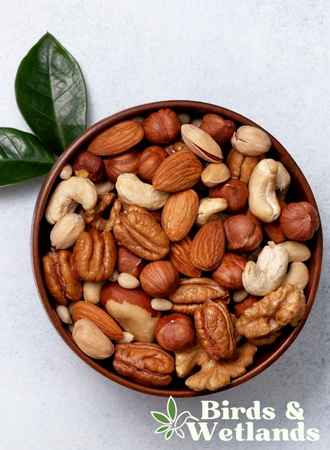
Can backyard geese eat peanuts?
Peanuts are a popular human food, and it turns out that backyard geese can eat them as part of a healthy diet as well. Peanuts are high in protein, essential vitamins, and minerals. Ducks eat peanuts, and so do geese.
Peanuts can also help keep geese’s plumage healthy and thick. However, as with any food, moderation is essential when feeding peanuts to backyard geese. Excessive consumption of peanuts can lead to obesity and other health issues, so limiting your geese’s intake is important.
Can geese eat salted nuts?
Geese enjoy peanuts, but the type of peanut they eat is just as important as the quantity. Waterfowl cannot process salt the same way we can, so they can only digest raw, unsalted peanuts. Feeding them salted peanuts will make them sick.
Even a small amount of salt can be harmful, so it’s best to avoid it entirely. Raw, unsalted peanuts are an excellent choice for a healthy treat for your feathered friends.
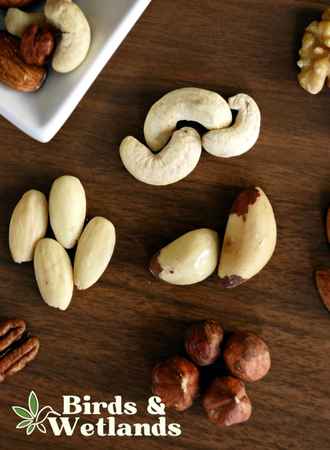
Can geese eat roasted peanuts?
Yes, geese can eat roasted peanuts as occasional treats, provided that they are unsalted.
Can geese eat peanut butter?
The answer is yes, but only in small quantities. Peanut butter is a good source of protein and fat for geese. Still, peanut butter should not contain added sugar and other preservatives.
If you want a healthy treat for your goose, offer them a small amount of plain peanut butter. Your goose will enjoy the taste, and you can feel good knowing that they are getting a nutritious snack.
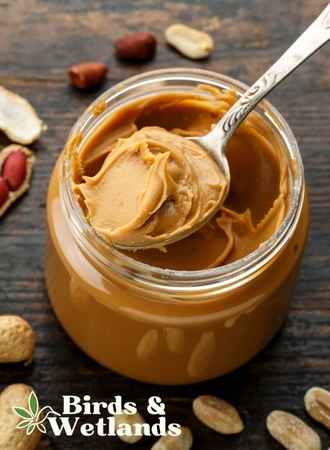
Can geese eat granola?
When it comes to cereal, all types are safe to feed to geese, though they prefer muesli, granola, and oat-based varieties with nuts. However, granola bars should be avoided because they often contain high sugar levels and other preservatives that harm their health.
Can geese eat pecans?
Pecans can be a nutritious and healthy treat for geese. These nuts contain protein, essential fatty acids, manganese, calcium and a good amount of copper. However, make sure you remove the pecans’ hard shells and chop them into small pieces.
While geese can eat pecans, they should not be eating pecan pie. A pecan pie is traditionally made with corn syrup and brown sugar, which are not good for geese.
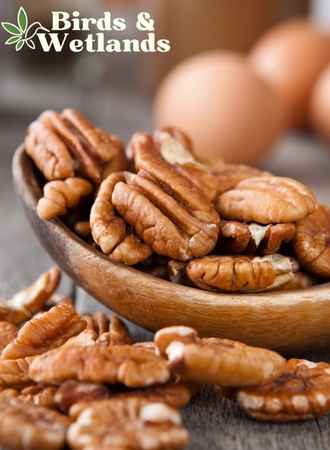
Can geese eat pistachios?
The answer is yes, geese can eat unshelled pistachios. In fact, they really enjoy them! Pistachios are a great source of protein and essential vitamins and minerals for geese. They are also a good source of healthy fats and antioxidants.
What are the health benefits of feeding geese nuts?
Geese benefit from eating nuts. Nuts are delicious and nutrient-dense, containing protein, dietary fiber, vitamins such as vitamin E, minerals, and phytochemicals with antioxidant properties. Additionally, they have no cholesterol.
A handful of daily nuts can help reduce LDL (bad) cholesterol and increase HDL (good) cholesterol. In addition, nuts can help reduce inflammation, which has been associated with various chronic diseases.
How often can geese eat nuts?
Geese are frequently seen eating nuts, but how often can they do so? Small amounts of nuts are fine occasionally, but too many nuts can cause digestive problems and serious health issues such as liver damage.
For these reasons, it is best to feed geese a limited amount of nuts rather than making them a staple of their diet.
How to feed geese with nuts
Geese enjoy nuts, so chopped or ground nuts are a great option if you want to treat your feathered friend. The nuts can be served dry or with fresh water. Because geese can be messy eaters, a mat or sheet should be laid down to catch any loose nuts.
After you’ve prepared the nuts, let your goose eat them. And once they’re done eating, remove all uneaten nuts before they become moldy foods. M
olds have a devastating effect on the health of geese. They are known to cause respiratory distress and other health problems.
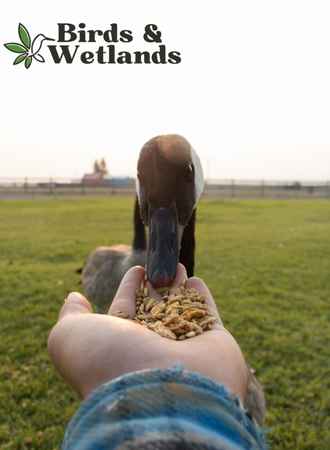
What foods can you mix peanuts with when feeding them to geese?
Nuts are popular and versatile foods for geese that, when combined with other foods, would make a nutritious and well-balanced diet. For instance, you can mix nuts with cracked corn, grains, wheat, dog kibble and cooked rice.
This food combination makes a well-rounded nutrition source. While many geese eat sunflower seeds, not all of them will, so you can do some trial and error here.
Other excellent food choices include vegetables. Geese are particularly fond of leafy greens, so your options can include cabbage, lettuce and kale.
Then there’s fruit and berries. Bananas, mangoes, apples, watermelons and pears are healthy, nutritious snacks to pair with nuts.
Geese also love to eat insects. Since nuts and insects provide a good protein source, you can alternate between the two food sources.

